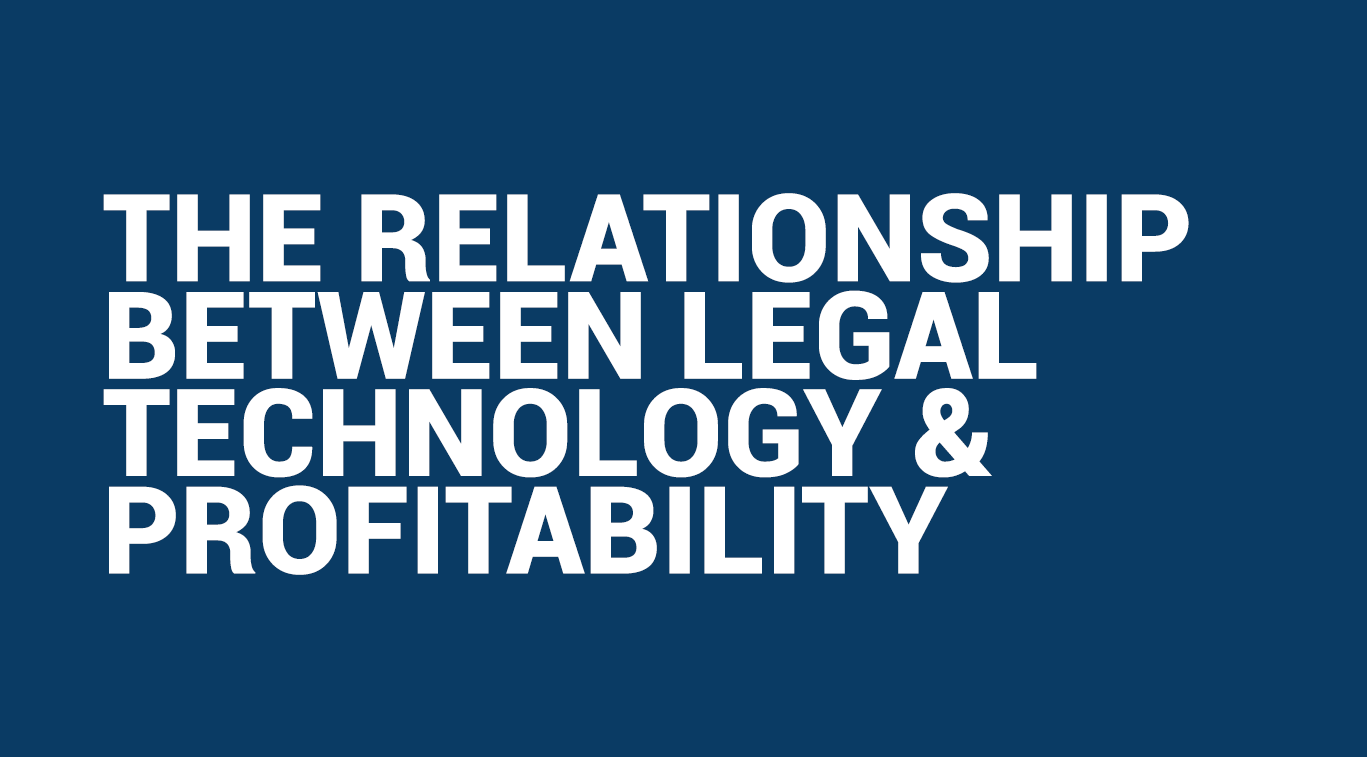The Relationship Between Legal Technology & Profitability

Written by Maryam Khan
Blogger

The pandemic severely impacted the global economy. The UK economy took a 9.7% hit in GDP, which is the steepest drop since records began and is almost equivalent to the decline in 1921 [1]. The pandemic’s challenges and uncertainty have also transformed how law firms operate and provide their legal services. According to the Impact of the COVID Crisis on the Legal Sector by Wolter Kluwer, 52% of law firms will work from home in the future, 62% of lawyers will increasingly collaborate remotely, 66% of law firms will digitally communicate with clients, and 41% of respondents across Europe are expecting an increase in virtual court hearings [2].
The changes in ways of working have resulted in new priorities being developed in terms of profitability and staying competitive in an already overcrowded legal market. There is a need for innovative solutions and strategies that reduce a law firm’s operating costs and increase efficiency to ensure rising profits. This is where adopting and investing in legal technology plays a crucial role in increasing a law firm’s profits. The 2020 Future Ready Lawyer: Performance Drivers Survey reported that the increasing importance of legal technology was a key concern for 76% of lawyers [3]. However, only 28% reported that their organisation is well prepared for adopting legal technology [4]. Therefore, legal professionals and law firms need to understand the relationship between legal technology and law firm profitability if they wish to excel in the future.
How Does Legal Technology Increase Profitability?
The use of legal technology significantly reduces a law firm’s operating costs by increasing a lawyer’s efficiency. Technology such as machine learning, artificial intelligence and data analytics have automated a law firm’s workflow, directly contributing to the revenue increase. This article highlights five ways legal technology solutions impact a law firm’s profitability.
Reduces Time Spent on Non-Billable Tasks
Legal technology solves a major issue law firms face; wasting time on non-billable tasks such as document organisation, chasing clients for payments and managing case files [5]. Automating these tasks using technology such as spend management software, document management software, and case management systems allow lawyers to allocate their time and energy to more complex tasks that require their expertise and are less administrative. Not only does legal technology reduce time spent on non-billable tasks, but it also increases a law firm’s billable hours. Time tracking software and cloud-based legal practice management solutions allow law firms to easily capture time spent on tasks, making billing clients an extremely smooth process that, if done manually, could have many errors in the billable hours calculated [6].
Increases Efficiency Through Artificial Intelligence
Artificial intelligence capabilities can be easily incorporated into contract drafting, reviewing and organisation, allowing lawyers to save up 80% of the time spent on such tasks [7]. Other legal technology software such as e-discovery and legal data analytics have allowed law firms to sift through large volumes of information to identify relevant information. This significantly improves law firm productivity as resources do not have to be wasted on hiring legal assistants to complete such tasks. Automating such processes allows lawyers to focus their non-billable hours on building client relationships, networking or staying up-to-date with regulatory changes. This allows law firms to do more in less time and provide their clients better value for their money as projects are completed much faster and more innovatively.
Develops a Competitive Edge
The increased competition in the legal sector stems from various sources, including alternative legal service providers and changing client demands [8]. Therefore, law firms must diversify their legal service and stand out from their competitors to retain their clients. Legal technology can help develop a competitive edge by providing an innovative and unique client experience. Technology also plays a vital role in law firm marketing, raising brand awareness and allowing firms to build a strong online presence. Lastly, client relationship management software is the most important technological tool used to develop a competitive edge. This allows firms to significantly improve their client and lead management to secure prospective clients [9].
Generates Sustainable Cost Savings
Following the pandemic and the popularity of remote working, many law firms have realised that they do not need an office to work efficiently. Some lawyers even argue that they are more productive when working from home. This approach is quite new for the legal sector, which is known to be quite traditional and paper-heavy. However, remote working, backed by digitalisation and legal technology tools, has become significantly popular due to the flexibility and sustainable cost savings.
A major cost-saving has been reducing printing and postage for law firms. With lawyers working from home and client communication being virtual, law firms are saving thousands on printing and postage after going paperless [10]. Using e-signature tools, document management systems, cloud technologies, and legal billing software has reduced the costs and time associated with carrying out these tasks manually. Moreover, working from home would not be an option without video conferencing software and other technological tools that enable greater collaboration and communication [11]. As a result, firms reduce their overheads and operating costs by saving on rent and utilities and using smaller workspaces (if any).
Leverages Data
Data analytics features within document management tools, practice management systems, and other legal software allow law firms to understand data relating to their practice. Access to such data and key insights allows law firm management to better understand their firm’s financial health, resource allocation and overall areas of strengths and weaknesses [12]. This information can be carefully analysed so that the appropriate adjustments are made, and measures are taken to grow profit and rectify internal weaknesses.
Final Words
As the world becomes more digital, law firms must use the best tools and resources available to remain competitive and increase their profitability in an increasingly competitive legal market. Law firms investing in legal technology are the ones experiencing the highest profitability and growth rates. Therefore, it is essential for law firms and their lawyers to understand the impact of legal technology tools on their practice, and the quality of legal service provided [13].
References
[1] Daniel Harari, Matthew Keep, Philip Brien, ‘Coronavirus: Economic Impact’, House of Commons Library (2021) at https://commonslibrary.parliament.uk/research-briefings/cbp-8866/
[2] Wolters Kluwer Blog, ‘The Covid Crisis Catalyses Legal Tech Adoption Among Law Firms’, Expert Insights at https://www.wolterskluwer.com/en-gb/expert-insights/the-covid-crisis-catalyses-legal-tech-adoption-among-law-firms
[3] Wolters Kluwer, ‘The 2020 Future Ready Lawyer Survey’ (2020) at https://know.wolterskluwerlr.com/2020-Future-Ready-Lawyer
[4] Ibid
[5] Wolters Kluwer Blog, ‘Increase Your Law Firm’s Profitability – Working Smarter, Not Harder’ (2018) at https://www.wolterskluwer.com/en-gb/expert-insights/increase-law-firms-profitability-working-smarter-not-harder
[6] Jeremy Byellin, ‘Increase Billable Hours with Legal Technology’, Thomson Reuters at https://legal.thomsonreuters.com/en/insights/articles/increase-billable-hours-with-legal-technology
[7] Erika Winston, ‘In the Age of Covid-19- Law Firm Profitability & Legal Tech Go Hand in Hand’, TimeSolv at https://www.timesolv.com/blog/in-the-age-of-covid-19-law-firm-profitability-legal-tech-go-hand-in-hand/
[8] ‘How Can Your Law Firm Improve Efficiency and Increase Profitability’, The Access Group at https://www.theaccessgroup.com/en-gb/legal/resources/law-firm-profitability-and-efficiency/improve-your-law-firms-profitability-and-efficiency/
[9] Ibid
[10] Ibid
[11] Philipp Rosenauer, ‘How Legal Technology Can Cut Overheads And Make Firms More Profitable’ (2018) at https://www.linkedin.com/pulse/how-legal-tech-can-cut-overhead-make-firms-more-philipp-rosenauer/
[12] Ibid (7)
[13] ‘Legal Technology and Law Firm Profits’, Accurate Legal Billing at Profits https://www.accuratelegalbilling.com/blog/legal-technology-and-law-firm-profits








